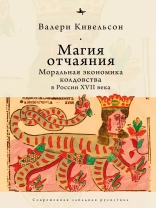In early modern Europe, thousands of women were burned as witches during the period of the witch hunts. From the court records of seventeenth-century Russia a very different picture emerges. The great majority of those accused of witchcraft were men. Broadly comparative, Desperate Magic by Valerie Kivelson is the first sustained study of seventeenth-century Russian witch trials. The book uses trial evidence to illuminate some of the central puzzles of Muscovite history. The routine use of torture in extracting and shaping confessions raises methodological and moral questions with continuing resonance in the world today. A major finding of this book is that witchcraft was not a marginal practice in early modern Russia. It was practiced by all ranks of society, from serf to tsaritsa at the same time that it was severely condemned and punished. Testimony from these cases lets us see into the emotional lives of illiterate women and men of the Russian past. This analysis shows how the State and relations of power were inscribed into everyday practices, and magic was used as a defense by ordinary people scrambling to survive in a fiercely inequitable world.
Про автора
Valerie Kivelson, Professor of History at the University of Michigan, is a specialist in early modern Russian history. Her books include «Картография царства: Земля и ее значения в России XVII века» (Moscow: NLO, 2012); Russia’s Empires, with Ronald G. Suny (Oxford University Press, 2016), and Witchcraft and Magic in Russia and Ukraine: Sources and Commentary with Christine Worobec (Cornell University Press, 2020).












